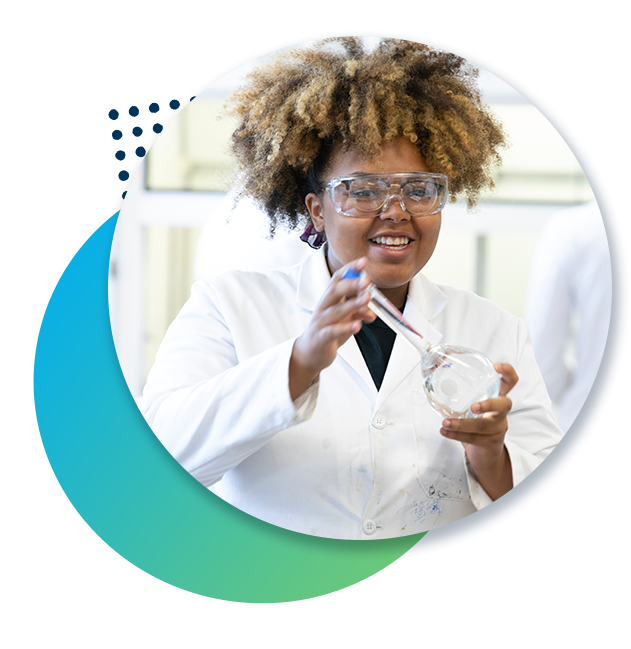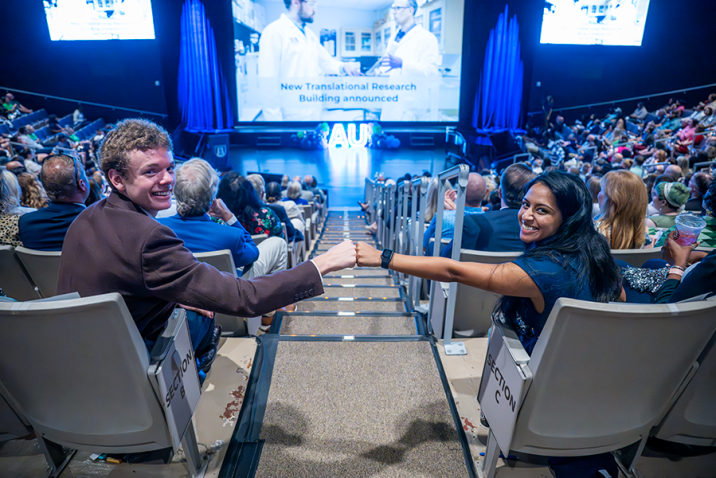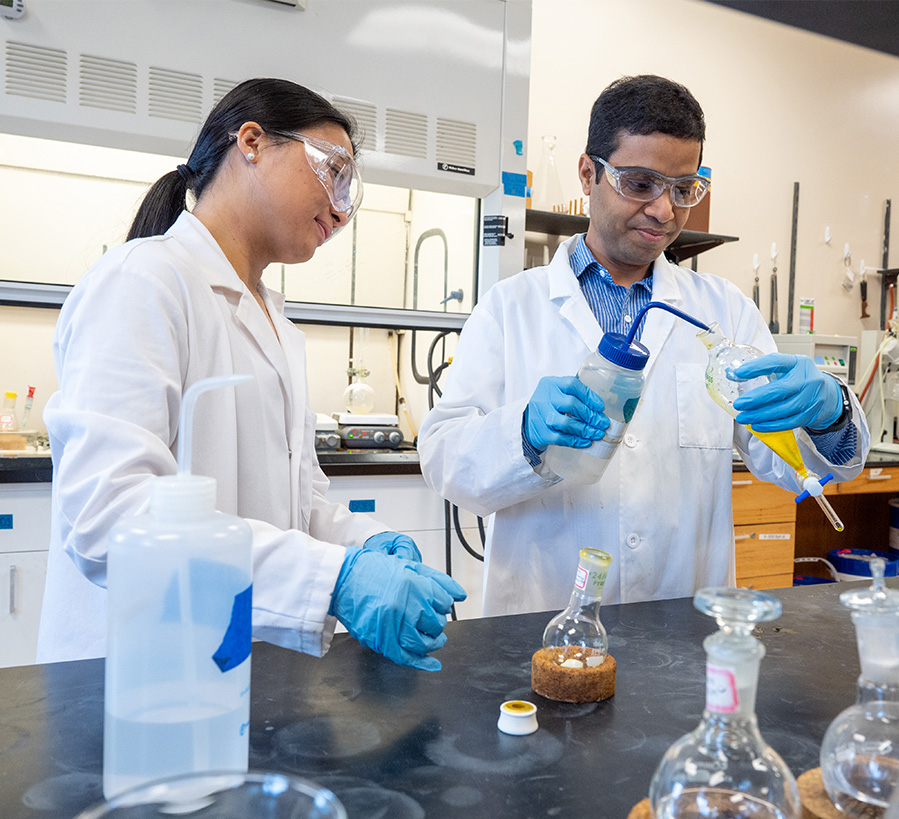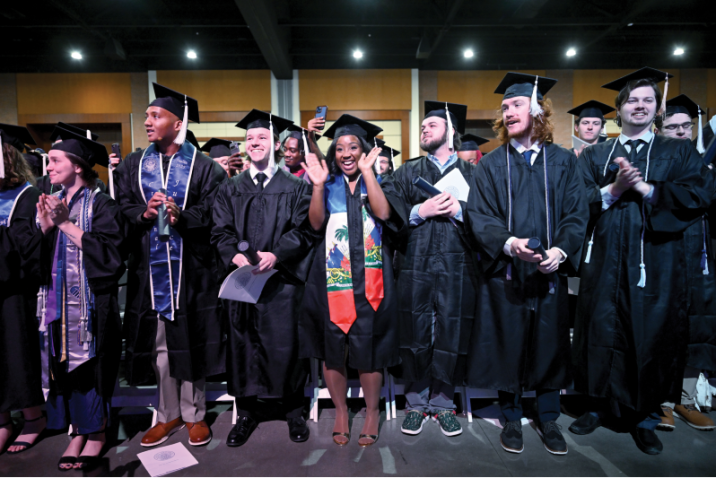Biomolecular Science
With a master’s in Biomolecular Science, you’ll be studying an innovative curriculum to gain expertise in data analysis, experimental methods, and problem-solving that will lead to an understanding of biological systems.
The degree allows you to choose between two concentrations. Students following the Cell and Molecular Biology path will focus on pharmacology, molecular physiology, and cancer biology. Students following the Medicinal Chemistry path will focus on drug development, including synthesis, rational drug design, and characterization using analytical techniques. Both have a research component consistent with the area of study.
By choosing to earn your master’s in Biomolecular Science from Augusta University’s College of Science and Mathematics, you’ll enter a flexible program with small class sizes, dedicated faculty and an innovative curriculum.
Students can receive a Teaching Assistantship that includes a full tuition waiver and a $2,000/month stipend—bringing tuition down to just $25 per semester (plus standard fees).
Biomolecular Science is for you if you consider yourself
Life-Changing
Life-Saving
Education
Want to learn more about the Biomolecular Science program at Augusta University?
Request InfoBiomolecular Program
What You'll Study
Coursework
Students in Augusta University’s Master of Science in Biomolecular Science will complete 36 credit hours of coursework, including a mentored research project.
Students will choose a concentration in either Cell and Molecular Biology or Medicinal Chemistry.
The length to completion is two years.
Curriculum | Admissions Criteria | Tuition and Fees | Application Deadlines
Focal Points
Concentrations
Cell & Molecular Biology
Cell & Molecular BiologyMedicinal Chemistry
Medicinal Chemistry



EXPLORE. EXCEL. EXPAND.
Graduate School Advantage
Augusta University's graduate programs are among the best in the nation – and the world – and our graduate students are our most valuable assets. To ensure that our students earn more than a degree, the Graduate School offers a range of opportunities so they can develop the leadership, communication and personal skills needed for a rewarding life and academic, research or professional career.
See what the Graduate School has to offer »
About the Graduate SchoolExperience-based Education
Outside the Classroom
The College of Science and Mathematics Building features 22 teaching labs, a tutoring
center, and a research-focused top floor. Students have access to advanced instrumentation—such
as NMR, LC-MS, CD and UV-VIS spectrometers, a fluorometer, qPCR machine, DNA sequencer,
and confocal microscopes—as well as tissue culture and model system facilities. Core
research facilities across Augusta University are also available.
Located on the Health Sciences Campus, the program offers unique opportunities for
interdisciplinary research alongside Georgia’s only public medical and dental schools.
Explore Research Lab Opportunities
Financial Support
Teaching assistantships can provide students with a stipend of $2,000 per month.
Thesis-Based
The thesis-based degree provides the opportunity to produce significant, publishable research.
Personalized Attention
Small classes and highly accessible faculty create a supportive environment that allows students to thrive with their coursework as well as their research.
Dual Concentrations
The degree’s two concentrations allow students to choose the path that excites them, leading to the career that satisfies them.
Your Future
Career Options
Graduates with a master’s in Biomolecular Science are prepared for careers in the
pharmaceutical, biotechnology, biomedical, and chemical industries. Our graduates are currently in medical school, pharmacy school, PhD programs, or working
in industry/academic research labs and teaching at the collegiate level.
According to the U.S. Bureau of Labor Statistics, job growth for medical scientists is projected to rise much faster than average. The median pay for a medical scientist is $100,890 per year.
Admissions Criteria at a Glance
GPA: Overall GPA of 3.0 on a 4.0 scale at the Baccalaureate level calculated on all undergraduate work.
Degree Requirement: Minimum of a Bachelor’s degree or equivalent in an appropriate STEM area such as a biological, chemical or pharmaceutical science from an accredited college or university. A minimum of an additional year of upper-level biology coursework is also strongly recommended.
Transcripts: Official transcripts are required from all universities and colleges ever attended. Unofficial transcripts from US colleges and universities can be used in the admissions review process in lieu of official transcripts for this program.
Standardized Test Requirements: Submission of an official GRE exam score is optional.
Letters of Recommendation: Recommendations from three scientists (faculty or other) must be submitted through the application portal.
Students in the Cell and Molecular concentration must have:
- One year of introductory Biology (including a laboratory component)
-
One year of introductory Physics (including a laboratory component)
-
One year of introductory Chemistry (including a laboratory component)
-
One semester of Organic Chemistry (including a laboratory component)
-
One semester of Biochemistry
-
Note: Two semesters of Organic Chemistry (with labs) is strongly recommended.
Students in the Medicinal Chemistry concentration must have:
- One year of introductory Biology (including a laboratory component)
- One year of introductory Physics (including a laboratory component)
- One year of introductory Chemistry (including a laboratory component)
- One year of Organic Chemistry (including a laboratory component), and
- One semester of Biochemistry
- Note: one upper division Biology course (3000 or 4000 level) is strongly recommended.
Competitive Applicants: Ideally, candidates will have completed an undergraduate research project or have a similar research experience through an academic/industry-related job.
International Students: Please review the verification process for international transcripts and the english proficiency requirement.
Tuition & Fees Estimate
$2,821*
Estimated total
Full-time / In-State / Per Semester
$236
Tuition Per Hour
$675
Mandatory Fees
View Detailed Program Tuition
*Tuition & Fees listed here are for in-state students enrolling in the university for Fall 2024 semester.
Detailed Program Tuition InformationApplication Deadlines
Fall '26 International Application Deadline
- March 1, 2026
Fall '26 Application Deadline
- May 1, 2026
Early submission of all application materials is strongly advised.
All required application materials and documents must be received in order for an application to be considered complete and before an admission decision can be made. The program does not accept applications after the application deadline; however, the program will continue to accept application materials until June 30th.

Why Augusta?
Being at the heart of the university’s research enterprise puts you in proximity to research being conducted not only by the College of Science and Mathematics but also by the Medical College of Georgia, the Dental College of Georgia, the College of Nursing, and the College of Allied Health Sciences.
Small classes and dedicated faculty provide individualized attention.
Opportunities for financial support through assistantships help you pursue your degree while providing desirable experience that will prove beneficial when moving on to your career or doctorate program.

AU earns Carnegie Elective Classification for Community Engagement
AU earns Carnegie Elective Classification for Community Engagement


